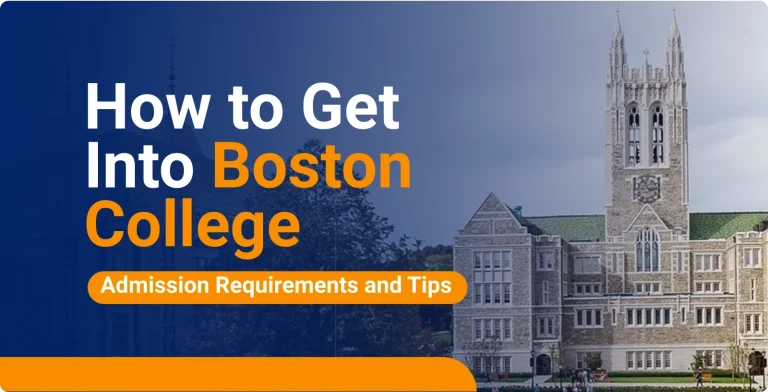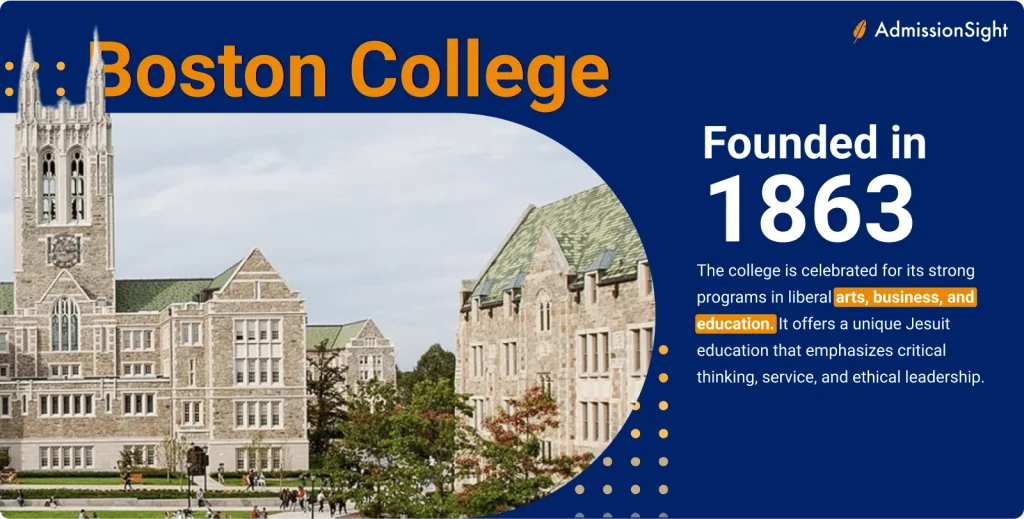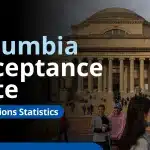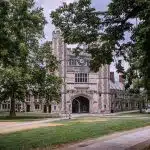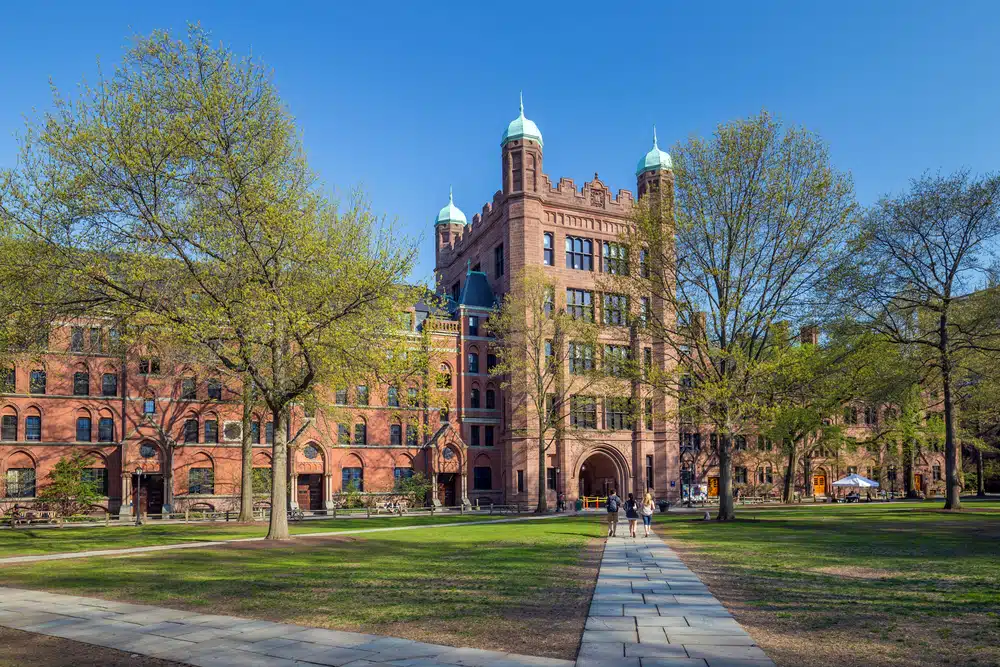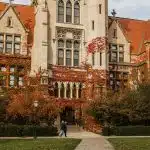So, you’re wondering how to get into Boston College. With its stunning campus, highly regarded academics, and vibrant student life, Boston College is a dream school for many—and for good reason. But let’s not sugarcoat it: Boston College doesn’t just let anyone waltz in. With an acceptance rate of 15.9% for the Class of 2028, the competition is no joke.
But hey, you’re not here to shy away from a challenge. You’re here to figure out exactly what it takes to stand out, and guess what? We’ve got you covered. In this guide, we’ll break it all down step by step: no fluff, just the insider knowledge you need. Let’s get into it.
- How Hard Is It to Get into Boston College?
- Boston College Admission Requirements
- Boston College GPA Requirements
- Boston College SAT Requirements
- Boston College ACT Scores
- How to Increase Your Chances of Getting into Boston College
- Boston College Application Deadlines
- Frequently Asked Questions
- Takeaways
Let’s cut to the chase: getting into Boston College is tough. For the Class of 2028, Boston College received 35,487 applications and admitted 5,632 students. That’s a 15.9% acceptance rate, which places it among the more selective universities in the U.S. You can check out the Boston College class profile for more insights.”
And if you’re curious about how the Boston College acceptance rate has changed over time, here’s a quick look:
|
Acceptance Rate |
|
|
Class of 2024 |
23.4% |
|
Class of 2025 |
18.9% |
|
Class of 2026 |
16.7% |
|
Class of 2027 |
15% |
|
Class of 2028 |
14.7% |
Notice the trend? Yep, it’s getting tighter every year. But don’t let that freak you out. With the right strategy and a killer application, you’ve got just as much of a shot as anyone else—maybe even better.
Boston College Admission Requirements
Applying to Boston College is pretty straightforward. They use the Common Application, and here’s what you’ll need to submit:
- High school transcript. Boston College wants to see that you’ve challenged yourself academically. Advanced courses like AP, IB, or honors are a big plus, and they recommend four years each in English, Math, Science, Social Studies, and Foreign Language.
- Letters of recommendation. Boston College requires the submission of the School Report and Counselor Recommendation Form, along with two teacher evaluations. The teacher evaluations should be written by teachers who have taught you in one of the five core academic subjects: English, Social Studies, Science, Math, or Foreign Language.
- Essays. The Common App essay (personal statement) and the Boston College Writing Supplement are your chance to shine. This is where you let the admissions team know who you are beyond the numbers.
- Extracurricular activities. Boston College is looking for leaders, doers, and impact-makers. Go deep into a few activities rather than spreading yourself thin.
- Standardized test scores (optional). Boston College is test-optional, so submitting scores is up to you. That said, strong numbers can give your application a little extra sparkle.
- Mid-year and final reports. These updates on your senior year performance are required, so don’t let senioritis get the best of you!
High school coursework recommendations
Think of your high school transcript as your application’s backbone. Boston College loves to see a well-rounded, rigorous course load. Here’s what they recommend:
- 4 units of English
- 4 units of Mathematics
- 4 units of Science (including 4 lab-based units)
- 4 units of Foreign Language
- 4 units of Social Studies/History
- At least 20 total academic units
If your school offers advanced classes like AP, IB, or honors, go for them! Boston College loves to see students who push themselves academically. Showing academic rigor in high school proves you’re up for the challenge of Boston College’s coursework.
But don’t stop there. Boston College looks beyond the numbers. They care deeply about your character, personal qualities, and the story you tell through your essays. Extracurricular activities? Absolutely. They want to see the impact you’ve made outside the classroom.
Talent and volunteer work? Yep, those matter too. And if you’re a first-generation college student, they’ll definitely take that into account.
On the flip side, things like alumni connections, demonstrated interest, or where you live? Not a factor. So don’t sweat what you can’t control. Instead, focus on the qualities and experiences that truly make you stand out. Show them the leader, thinker, and doer that you are. That’s what will set you apart.
Boston College GPA Requirements
Boston College doesn’t officially set a minimum GPA, but let’s not kid ourselves. Your grades need to be stellar to compete.
Boston College average GPA
Boston College doesn’t officially publish GPA data, but since it’s a top school, we estimate it to be around 3.9. If you’re curious about class rank, these are the stats according to Boston College’s Common Data Set for 2023-2024:
- 89.4% of admitted students were in the top 10% of their high school graduating class.
- 96.8% were in the top quarter.
- 99.4% were in the top half.
Meaning? The vast majority of Boston College students were academic rock stars in high school. If your school doesn’t rank students, don’t stress. Boston College evaluates applications holistically, so there’s still room to stand out.
To stay competitive, aim for a GPA of 3.9 or higher. It’s a high bar, sure, but don’t sweat it if you’re not quite there. Boston College isn’t just looking for straight-A robots. They want real, well-rounded humans. If you’re crushing it in other areas like essays, extracurriculars, or leadership, that can absolutely tip the scales in your favor.
Bottom line? Shoot for the stars when it comes to your GPA, but remember: Boston College cares about more than just the numbers. Show them the real you: your ambitions, your quirks, your drive. Hard work, some self-reflection, and a dash of personality will take you far.
Boston College SAT Requirements
Boston College doesn’t have a strict SAT requirement, but if you’re sending in scores, they need to be competitive. With Boston College’s test-optional policy, submitting scores is entirely up to you.
That said, strong numbers can give your application an extra edge and show the admissions team you’re ready to tackle academics at one of the top universities in the country.
Boston College’s average SAT scores
According to Boston College’s latest Common Data Set, here are the usual scores of students submitting their SAT:
|
25th Percentile SAT Composite Score |
50th Percentile SAT Composite Score |
75th Percentile SAT Composite Score |
| 1490 |
1520 |
Here’s a deeper look at the section scores:
|
Section |
25th Percentile Score | 50th Percentile SAT Composite Score |
75th Percentile SAT Composite Score |
|
SAT Evidence-Based Reading and Writing (EBRW) |
710 | 730 | 760 |
| SAT Math | 720 | 760 |
780 |
91.99% of admitted students scored between 1400 and 1600 on the SAT composite. For the EBRW section, 84.14% scored between 700 and 800, while in Math, an impressive 89.27% hit that range.
To stay competitive, aim for a composite score of 1490 or higher, with strong performances in both Math and EBRW. Scores in this range will show Boston College that you’re ready for the academic rigor of their programs.
But don’t let that discourage you if your scores are slightly below this range. Boston College takes a holistic approach to admissions, which means they’ll evaluate your entire application: essays, extracurriculars, recommendations, and all.
If you have the time and resources to retake the SAT and boost your scores, go for it, especially in Math and EBRW. While submitting scores isn’t required, strong results can give your application an extra edge.
Does Boston College require SAT scores?
Nope! Boston College follows a test-optional policy, so it’s up to you whether to submit SAT or ACT scores. If your scores are strong, though, they can definitely add some weight to your application and showcase your academic abilities.
Here’s another bonus: Boston College superscores the SAT. This means they’ll consider your best section scores across multiple test dates, which can work in your favor if you’ve taken the test more than once. While sending scores isn’t a must, a strong performance can still give your application a nice boost.
Boston College ACT Scores
Boston College doesn’t have a strict ACT score cutoff, but if you’re submitting scores, they need to bring the heat. The ACT is your chance to show Boston College that you can handle their challenging academics, and maybe even flex a little while you’re at it.
Boston College’s average ACT scores
According to Boston College’s latest Common Data Set, here’s the breakdown of the ACT scores of admitted students:
|
25th Percentile ACT Composite Score |
50th Percentile ACT Composite Score |
75th Percentile ACT Composite Score |
|
33 |
34 |
34 |
For individual sections, here’s what you should aim for:
|
Subject |
25th Percentile ACT Composite Score | 50th Percentile ACT Composite Score |
75th Percentile ACT Composite Score |
|
ACT Math |
30 | 32 |
34 |
|
ACT English |
34 | 35 |
35 |
|
ACT Reading |
34 | 35 |
36 |
|
ACT Science |
32 | 33 |
35 |
And check this out:
- 98.9% of admitted students scored between 30 and 36 on the ACT Composite.
- 96.8% crushed it in English with scores between 30 and 36.
- 81% hit that same top range in Math.
- 99.2% dominated Reading, also scoring between 30 and 36.
- 95% rocked Science with scores in the 30–36 range.
Aim for a composite score of 34 or higher to stay competitive. Boston College is looking for students who can thrive in their academically demanding environment. If you can hit the upper ranges in English and Math, even better.
But don’t freak out if your scores aren’t quite there! Boston College takes a holistic approach, so your essays, activities, and recommendations all play a role in the big picture.
Does Boston College prefer the ACT or SAT?
Not at all. Boston College doesn’t care which test you take. Whether you’re an ACT ace or an SAT superstar, both are equally valid in the eyes of the admissions office.
Among first-year applicants, 28% submitted SAT scores, while only 16% submitted ACT scores. That means both tests are commonly accepted, but a majority of applicants lean towards the SAT.
Also, Boston College superscores! That means they’ll take your best section scores from multiple test dates to give you the highest possible composite. So, if you’ve tested more than once, this works in your favor. No pressure, but a strong superscored result could add that extra oomph to your application.
How to Increase Your Chances of Getting into Boston College
Getting into Boston College isn’t easy; it’s competitive, prestigious, and attracts some of the brightest students. But don’t worry! You’re here to craft an application that stands out, and with the right strategy, you can make it happen. Here’s how:
1. Keep your GPA in tip-top shape.
There’s no denying it: Boston College values strong academics. 89.4% of them were in the top 10% of their high school graduating class. If you want to stay in the game, your target GPA should be 3.88 or higher, and your transcript needs to tell a story of hard work and ambition, with challenging courses like AP, IB, or honors.
That said, perfection isn’t the only thing Boston College looks for. They appreciate resilience and growth, so an upward grade trend can make an impact.
If a particular subject has you stumped, don’t be afraid to ask for help, whether that’s through hiring a private tutor, joining study groups, or practicing extra. Consistent effort will show Boston College that you’re ready for their academic rigor.
2. Submit strong SAT/ACT scores (if you choose to).
Boston College is test-optional, which means you’re in control of whether standardized test scores make an appearance on your application. That said, if your scores are strong, they can give your application an extra boost.
Admitted students typically score between 1450–1520 on the SAT or 33–34 on the ACT. And here’s the kicker: 91.9% of admitted students scored between 1400–1600 on the SAT, while 98.9% landed between 30–36 on the ACT Composite. Aim for scores within these ranges.
Not quite there? Practice makes perfect. Use practice tests, focus on your weakest sections, and consider hiring a private tutor if needed. And remember, Boston College superscores both the SAT and ACT. This means they’ll cherry-pick your best section scores from multiple test dates to create your highest possible composite.
If standardized tests aren’t your strong suit, don’t worry. Pour your energy into crafting an application that showcases your unique strengths and stands out in every other way.
3. Write essays that show your true colors.
Your essays are a golden opportunity to show Boston College why you deserve to be there. Boston College wants to see your values, intellectual curiosity, and critical thinking skills on full display. This is where your unique personality and perspective can shine, so make it count!. If you’re considering why Boston College might be the right fit for you, explore their official page on Why Choose Boston College to learn more about its academic mission and community.”
Boston College’s supplemental essays for the 2024–2025 application cycle offers several prompts and students are required to respond to just one of them. However, students applying to the Human-Centered Engineering (HCE) major must respond to Prompt #5 instead.
Boston College essay prompts:
- Each year at University Convocation, Boston College’s incoming class engages in reflective dialogue with the author of a common text. What book by a living author would you recommend for your incoming class to read, and why would this be an important shared text?
- At Boston College, the Jesuit tradition emphasizes finding worthwhile conversation partners. Some support our viewpoints while others challenge them. Who fulfills this role in your life? Cite a specific conversation where this partner challenged your perspective—or where you challenged theirs.
- In her TED Talk, The Danger of a Single Story, Chimamanda Ngozi Adichie discussed how assumptions based on someone’s nationality, appearance, or background can limit understanding. Reflect on a time you were defined by a “single story.” What challenges did this present, and how did you overcome them?
- Boston College’s founding in 1863 was in response to society’s call—providing education to address societal needs. Today, the university continues this tradition by empowering students to tackle society’s greatest challenges. Which of today’s local or global issues resonates with you, and how might you use your Boston College education to address it?
- Human-Centered Engineering Applicants Only: One goal of a Jesuit education is to serve the common good. HCE at Boston College integrates technical knowledge, creativity, and a humanistic perspective to address societal challenges. What societal problem is important to you, and how will you use your HCE education to solve it?
To nail your essay:
- Pick the right prompt. Choose the one that resonates with you most and gives you the best platform to share your unique story or ideas.
- Be authentic. Let your personality shine by sharing something meaningful and honest about yourself. Admissions officers want to see the real you, not what you think they want to hear.
- Be specific. If you’re recommending a book or reflecting on a conversation, don’t just describe it. Explain why it matters to you and how it shaped your perspective.
- Show depth. Use your essay to showcase how you think and how you’ll contribute to Boston College’s academic and community environment.
Take the time to plan, write, and refine your essay. This is where Boston College gets to see the real you, so don’t hold back. Let your passion, curiosity, and unique perspective take center stage, and you’ll create an essay that’s not just memorable but impossible to ignore.
4. Crush it in your extracurriculars.
Boston College isn’t just looking for students who dabble in activities. They want leaders, innovators, and changemakers who aren’t afraid to roll up their sleeves and make an impact. It’s not about how many clubs or projects you’ve been part of; it’s about how deeply you’ve committed and the difference you’ve made.
For instance, if social justice is your jam, you might share how you started a club advocating for equity in your community or volunteered at a legal aid center assisting immigrants—both of which tie perfectly to Boston College’s Jesuit mission of service and social responsibility.
Love science? Maybe you led a project researching sustainable energy solutions or organized a local environmental cleanup campaign, which is something Boston College would totally vibe with, given their focus on sustainability through programs like the Schiller Institute.
And let’s not forget community service. Boston College eats this up. Did you mentor underprivileged kids after school or spend your Saturdays coordinating donations for local food banks? These kinds of efforts show you’re not just about clocking hours; you’re about making a meaningful impact.
Boston College wants to see what gets you fired up, how you’ve left your stamp on the world, and how you’ll channel that same passion into their campus community. Be the person who not only dreams big but gets things done.
5. Nail your recommendations.
A killer recommendation letter can take your application from impressive to downright unforgettable. Boston College requires a School Report from your counselor and two teacher evaluations from teachers who’ve taught you in core subjects like English, Math, Science, Social Studies, or Foreign Language.
Don’t wait until senior year to start impressing your teachers. Be that student who’s genuinely engaged: ask interesting questions, show enthusiasm for their subject, and maybe even stick around after class to chat about something that sparked your curiosity.
When it’s time to ask for a recommendation, pick the teachers who know you best: the ones who’ve seen your growth, resilience, or that time you nailed a group project when no one else stepped up.
Give them at least a month’s heads-up (because nobody writes their best work under pressure) and hand them a “brag sheet” with everything you’ve achieved, your goals, and any specific moments they might want to highlight.
Once the letter’s in, thank them. Like, really thank them. A heartfelt note or even a quick email can go a long way in showing your appreciation. Teachers don’t have to do this—it’s extra work for them—so make sure they know you’re grateful.
Bottom line? Help your teachers help you, and you’ll end up with recommendation letters that make Boston College sit up and take notice.
6. Consider applying Early Decision (ED).
If Boston College is your absolute dream school, then Early Decision might be your best move. Here’s why: for the Class of 2027, Boston College received 4,421 ED applications and admitted 1,331 of them, giving an ED acceptance rate of around 30.1%. That’s significantly higher than the acceptance rate for Regular Decision (15%), so ED can give you a noticeable edge.
But here’s the catch: ED is binding, which means if you’re accepted, you’re committing to pack your bags and head straight to Chestnut Hill. No backing out. So, don’t apply ED unless you’re absolutely, 100% sure Boston College is your perfect match—academically, socially, and financially.
Applying ED isn’t just a strategic move; it’s a bold declaration. You’re saying to Boston College, “You’re the one, and I’m all in.” If that sounds like you, then go for it. It might just be your golden ticket to Eagle Nation.
Boston College Application Deadlines
Got your planner ready? Staying on top of these deadlines is key to making your Boston College dreams a reality. Here’s the rundown of dates you absolutely cannot miss:
|
Date |
Event |
|
August 1 |
Application Start |
|
November 1 |
Early Decision I Deadline |
|
December 15 |
Early Decision I Notification |
|
January 2 |
Early Decision II Deadline |
|
February 15 |
Early Decision II Notification |
|
January 2 |
|
|
April 1 |
Regular Decision Notification |
|
May 1 |
Reply Date (College Decision Day) |
Once you get that acceptance (manifest it!), don’t leave Boston College hanging. Regular Decision admits have until May 1 to confirm their spot, while Early Decision commits are, well, already committed.
Stay ahead of the game, set reminders, and imagine yourself walking Boston College’s beautiful campus. It’s closer than you think!
Frequently Asked Questions
1. How do I get into Boston College with low test scores?
If your SAT or ACT scores aren’t hitting Boston College’s middle 50% range (SAT 1450–1520 or ACT 33–34), don’t panic. Boston College is test-optional, so you’re not required to submit scores. If you think your scores won’t add value to your application, focus on other areas: your GPA, essays, extracurriculars, and recommendation letters can make all the difference.
2. What are Boston College’s GPA requirements for admission?
While Boston College doesn’t set an official minimum GPA, most admitted students have stellar academic records. Boston College doesn’t publish data on GPA, but your target should be at least 3.9 or higher. Taking challenging courses like AP, IB, or honors is key to showing you can handle Boston College’s rigorous academics. If your GPA isn’t quite there, balance it out with impressive extracurriculars, standout essays, and strong recommendation letters.
3. Does applying Early Decision improve my chances of getting into Boston College?
Absolutely! Applying ED shows Boston College that it’s your top choice, and it can give you a leg up. For the Class of 2027, Boston College received 4,421 Early Decision applications and admitted 1,331 students, resulting in an ED acceptance rate of about 30.1%. This is higher than the RD acceptance rate (15%). But keep in mind, Early Decision is binding, so if you’re admitted, you’re committing to enroll.
4. Is Boston College test-optional?
Yes, Boston College is test-optional, meaning you don’t have to submit SAT or ACT scores unless you want to. If your scores are strong, sending them can give your application an extra boost. But if they’re not, focus on other parts of your application. Boston College evaluates applicants holistically, considering everything from academics to extracurriculars to essays and recommendations.
5. How much does it cost to attend Boston College?
For the 2024–2025 academic year, tuition at Boston College is $69,400 per year. When you include housing, meals, books, and other fees, the total cost of attendance is approximately $89,348 annually. The good news? Boston College offers generous financial aid packages, including scholarships and grants, to help make their education more accessible.
Takeaways
Trying to figure out how to get into Boston College? Here’s a quick recap of the most important things to know:
- With an acceptance rate of 14.7%, Boston College is highly selective. To make your application stand out, it needs to tell a compelling story. Strong academics, thoughtful essays, and impactful extracurriculars are a must.
- Aim for a GPA of 3.9 or higher and take rigorous courses like AP, IB, or honors to show you’re ready for Boston College’s academic challenges.
- Test scores are optional, but if you’re submitting them, shoot for a strong range: SAT 1450–1520 or ACT 33–34. Boston College superscores, so send your best sections!
- Make your essays and extracurriculars pop. What gets you fired up? What impact have you made? And remember, Boston College loves students who care about community, so show how you’re already walking that talk.
- Not sure where or how to start? Working with a college admissions consultant could be just what you need. Let AdmissionSight guide you through the process and help you craft an application that Boston College simply can’t overlook.

